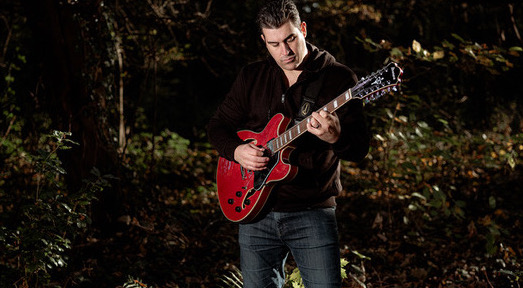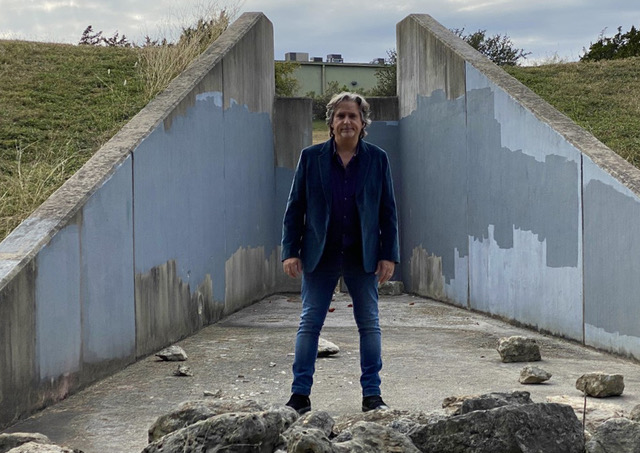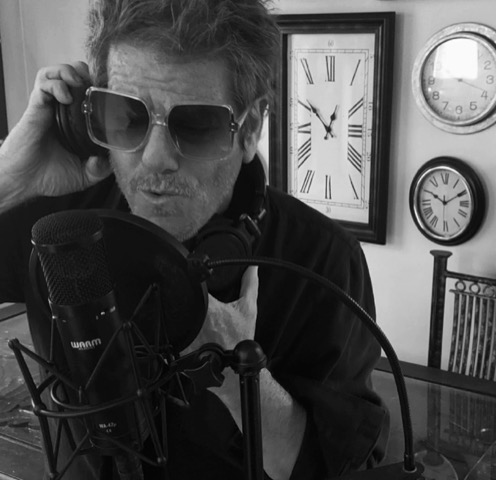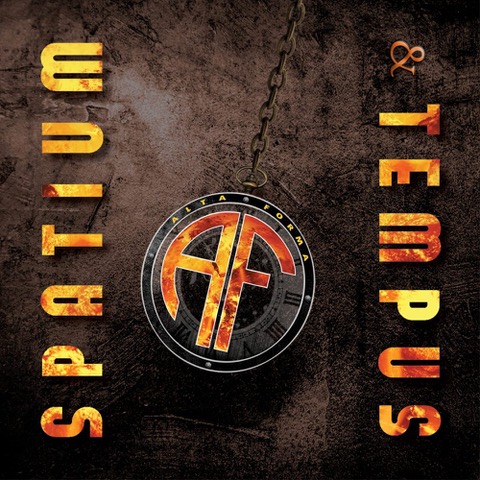(Raffaella Mezzanzanica)
We interviewed Antoine Fafard for the first time in December 2020 and we talked about his view on music, his regimented way of composing, his future projects but, above all, about Chemical Reactions, the album he had just published with Gavin Harrison (https://bit.ly/3W4pVHV).
Almost two years after, he is back with a new project called Alta Forma and a debut album, Spatium & Tempus, where Antoine has decided to add lyrics to his music for the first time ever.
In this interview, which happened to be on October 21, the new album official release day, we deep-dived into his new project, but Antoine also gave some insights on what he is currently working on.
Q.: Today is the big day! It’s the album official release day, right?
A.F.: Yes, it is. It is just a coincidence that, after the delay we’ve experienced in setting up this conversation, today is the official release day. To be frank, a release day does not make a huge difference for what I do. We don’t throw out a special launch party or anything like that. It just means that now the album is widely available, via vendors like Amazon and various online or even physical shops around the world. I am also trying a different strategy this time. Spatium & Tempus is currently only available on my website and Bandcamp. Independent musicians are always trying to maximize their potential revenue and streaming platforms like Spotify or Apple Music do not pay artists much. At the moment, I am personally shipping CDs ordered on my website – that’s the best way anyone can support an artist – buy directly from them!
Q.: Do you still take care of all aspects regarding your albums?
A.F.: As you can see behind me (he points out to some boxes) these boxes are full of CDs I am ready to ship and I am also expecting some vinyls copies some time soon. Regarding the vinyl format, the problem is that the production is very slow. I placed my order about four months ago and I am still waiting for the copies. The long process is simply due to the fact that the overall demand exceeds the production capacity.
Q.: Which company did you partner with to produce the vinyls?
A.F.: I have used a UK based company called Cyclone but the actual products were manufactured in the Czech Republic. Meanwhile, CDs are still widely produced around the world, so we don’t have the same production delays. We’ll see how the vinyl copies come out. It is an experiment for me. Overall, it’s a first vinyl and also a first album with lyrics!
Q.: When I interviewed you for the first time in December 2020, you explained that you are used to work on different projects at the same time. Was it the same for “Spatium & Tempus”?
A.F.: Yes, it has been the same. When we last spoke, I already had a few songs ready for Spatium & Tempus. I might have mentioned this project to you at that time. I probably started working on songs with lyrics about four/five years ago. It is like at this very moment, I might be releasing a new album, but I have a multitude of projects that I am working on in parallel. I am thinking about doing a follow-up to Spatium & Tempus with JK and Todd. In fact, I already have about half the album written.
Q. Have you been thinking about working with a female vocalist?
A.F.: Yes! The challenge is always to find a person who wants to collaborate. The reason why it took me so long to release an album with a vocalist – a male vocalist in this instance – is that I had not met someone who was interested, had the same vision or was available. These are fundamental factors. You asked about a female vocalist. This is very interesting because I have recently done some bass tracks for a vocalist called Hayley Griffiths and who has just released an album. She is a very good singer and I just thought I could write some music for her. She’s released music that has strong Celtic or medieval influences, but she has also done progressive metal in her career. Her husband is a drummer and they both live close to where I live. I think we could make some music together.
Q.: There are not so many female vocalists as far as progressive music is concerned. What do you think?
A.F.: There are excellent female vocalists around the world, but unfortunately, it is quite rare to see them to do progressive music. But there are some I can think of…For instance, I would qualify Kate Bush a progressive musician and her work was pretty spectacular! I do like the idea is to write for a female singer and see if it can lead to something interesting.
Q.: As you previously mentioned, you also have a very regimented creative process. Was it hard to match working on different projects together with this new one where you also added writing lyrics as an additional complexity?
A.F.: For me the process is always the same. It is not because you are working with a singer that it’s different. As far as my projects are concerned, we often record the drums at the end… which is I guess unusual. For example, Gavin (Harrison) recorded his drums on Chemical Reactions at the end, and on this album, Todd (Sucherman) also recorded his tracks at the very end. That means we have all the parts, including the final vocals, and Todd can work with 99% of the music that will end up on the album. I may have done some adjustments to my own tracks later, but nothing drastically different from what Todd worked with.
So for this project, JK and I worked together on the structure of the songs. For example, he might have asked me to change a chord in a specific place or to make a chorus longer. When we are talking about the structure of the music, it becomes a fundamental part to the composition process. I did not want to send Todd some unfinished songs or demos that weren’t structurally set in stone. My aim is to maximize people’s time. In comparison to my previous albums, the difference for this project is that some of the songs were rearranged using the singer’s input. That was unusual for me because after I was first sending him almost a whole song, he would then add his own thoughts and suggestions that sometimes resulted in significant changes to be made. I have rarely worked that way because I am used to be the only master of my own projects. But I was definitely open to this kind of collaboration which ended up being very productive.
Q.: Considering that you usually compose for drummers and, on top of this, having a specific drummer in your mind, did you also work on this project having Todd Sucherman in mind for all the songs since the very beginning?
A.F.: The original idea I had in mind was to do a progressive album with a singer and have Todd on drums. When I approached Todd about the project, I didn’t have a singer and temporarily had myself singing on the demos. He immediately recommended JK Harrison who quickly ended up being part of the project. I did ask some other singers before approaching Todd, but they were not really interested. I thank Todd for introducing me to the perfect singer and collaborator for this project!
Q.: How was working with JK Harrison and dealing with the ideas he provided?
A.F.: JK provided a lot of ideas… both from an arrangement stand-point where he would make suggestions to music I that I wrote, and also provided chord progressions that he composed. JK has a music sensibility that is often more pop-oriented than me. I like to listen to all music, but when it comes to music that I want to work on creatively, I can identify what is compatible with my own music sensibility. Of all the original ideas JK sent me, I did retain two that ended up in two songs. In fact, JK is credited as the composer on “Invisible Time”. That song is 99% his music and I gave him credit for that. He had this cool progression and he asked me to add lyrics, which I did. I think I have worked with someone else’s chord progression only once before. It can be strange at first, but when I had a connection with the music I’m sent, I can make it my own. Consider that, at this point, I have more than 20 years of doing everything myself and I have always been the main composer on all my projects.
Q.: In the documentary about the project you mention the importance of “chord progression” together with adding “elements of change” to your music. Can you tell an example of how you have achieved this?
A.F.: I have realized that for me music has to include an interesting chord progression… a lot of effort goes into this alone. It is the fundamental. I love drums, rhythm, polyrhythm, crazy bass and guitar riffs, but if you do not have a solid chord progression, music does not express all its core potential. This has been the case for me for the last ten years: working on interesting chord progressions and on more sophisticated modulations. And I am still working on it. It is always a priority. And then you can surprise people with modulating the key. Modulating meaning to change key… and when you change key in an unusual way, you can surprise the audience that didn’t see it coming. An other way to surprise the listener is to play with the rhythm, in a sort of permutation of time. I think I have achieved these here and there in this album. But you can still listen to it as a whole without being overly surprised in a too drastic way. Hopefully it’s a well balanced album. By the way, the integration of a singer was not to make a commercial album. I just want to clarify that. This music is completely true to me and to my collaborators.
Q.: The album is about “universal concepts” as time and space are. What is your relationship with these two elements?
A.F.: I think it is a very similar relationship to what most people have with these two elements. You realize that time passes very quickly. Everybody is affected by time and how fast it goes. The older you get, the faster it goes. Sometimes I like the concept of slowing time. Space and time are concepts I use to talk about existentialism. Time and space are fundamental existential elements. It is a universal truth. Time is also invisible. You do not see it but you can feel its impact. I would also like to explore the concept of what if time could go backwards or parallel universes. What if you can go back in time, woke up and being younger? That idea was explored in “The Curious Case of Benjamin Button” which I thought was an original concept. My relationship with time is I think like everyone else: it is frustrating, overwhelming. The title of the album – Spatium & Tempus – is a sort of existentialist twist on what is everything.
Q.: There’s a question I would like to ask you about the track list. You have given a detailed explanation on the meaning of the songs in the booklet of the album, but I’m curious about the decision to place “Comfort Zone” as the first song and “Apocalyptus” at the very end. You know, a bad event comes first and then there’s a sort of comfort to it. Can you explain the reason behind this choice?A.F.: The reason why the songs were placed in the current order was mainly from a musical standpoint. And yes, “Apocalyptus” is about self destruction but it is also the heaviest song of the album. I think it is the most aggressive sounding song, and I also think it is not representative of all the album. This is the reason why I wanted to put it at the end. As you said, it is also “apocalyptic”. And for those two reasons I thought we needed to close the album with it. As far as “Comfort Zone” is concerned, I wanted something punchy to start the album, with the drum fills which bring is some excitement. It is also the last song I wrote. The beginning sounds a little bit like “Kashmir” by Led Zeppelin. It is a little bit a tribute to them.
Q.: As for your previous projects, you also took care of all aspects, including the graphic design. Did you decide it after all the songs very ready or was it something you decided in the making of the album?
A.F.: The grahic design was completed at the end. The image associated to a project is often difficult because I am not always sure on what to go with. I usually prefer to have a graphic designer to do it. In this specific case, I definitely wanted the image of a clock but had a different concept which ended up not being used. I basically wanted something to represent at least the notion of time. For the vinyl version, there is a very different artwork. For that format, I hired someone to do something impactful from a visual point of view, because the vinyl has a bigger size and you can play more with the design.
Q.: Back in December 2020 I asked you if you had plans to add some more challenges to your music and you told me you were working on new music with lyrics. So, I’m asking the same question today: what’s next for you?
A.F.: If I talk about my future projects, I then really needed to finish them! I really want to do another album with lyrics, so there will be a second Alta Forma album with JK and Todd. I also want to do a second album with Gavin Harrison… a lot of music has already been composed for that. Therefore, depending on where I put my priorities, I should soon be able to finish the music for that too. But then it’s up to Gavin’s availability to record. I keep that project for him on standby.
I am also working on a piano concerto. No drums or electric bass. I am composing this piano concerto that will eventually be performed by a pianist and a real orchestra, without any programmed music or samples. That would be part of a piano-focused album. It will be the first album where I will not play any instrument. This project is for a more distant future. It requires a lot of work and a decent budget too. I guess these are the three main projects I’m currently working on. But I have ideas for more. I could mention other things but they are less likely at the moment.
Q.: You told me you were also working on a project using unconventional instruments. Am I right?
A.F.: Yes, that is the project with Gavin. I have a friend who plays various handpans. I actually discovered this instrument through him. He’s already recorded a few tracks for me. The next album with Gavin will include a blend of many instruments… I want the music to feature unusual textures from an orchestration point of view.
Spatium & Tempus was released on October 21, 2022
Track listing
1. Comfort Zone
2. Impossible Hero
3. Climbing to Infinity
4. Never After
5. Invisible Time
6. Time to Dive
7. Hear Now
8. His Mind’s Universe
9. Apocalyptus




